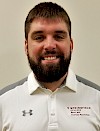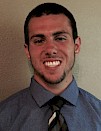AASP Newsletter - January 2020
Young Writers’ Corner: Failing Forward - Lessons Learned from Mental Performance Consultants
 |
 |
 |
 |
 |
|
|
|
|
|
|
Carly Wahl, M.S., University of Wisconsin-Milwaukee
Thomas Gretton, M.S., M.A., Florida State University
Eric Belt, M.S., Springfield College
Shawn Saylors, M.A., Springfield College
Nate Wolch, M.S., Western Washington University
Novice practitioners in helping professions, such as education and healthcare, can often experience feelings of incompetence and low confidence that stem from their lack of experience (Stephens, Smith & Cherry, 2017). Concerns and challenges of this nature are faced by novice professionals in the field of sport psychology as well. Anecdotal evidence from conversations among neophyte Mental Performance Consultants (MPC) demonstrate that they are quite concerned about making mistakes when working with clients, and potentially “failing” as a practitioner. The idea that established practitioners seldom make mistakes is a myth that can hinder the development of many new MPCs. Often, instead of perceiving the mistake-making process as an essential part of any practitioner’s learning and development, they fear making mistakes. As novice practitioners ourselves, we understand that it is sometimes difficult to remember that established practitioners were once in our shoes. In order to help normalize mistake-making, we sought to better understand sport psychology practitioners’ experiences of “failing forward.”
To achieve this goal, five practitioners with various levels of expertise were interviewed. The practitioners were asked to share their stories of mistake-making, and to reflect on how these mistakes have helped shape their consulting careers. Practitioners were purposefully selected based on their range of experience. We included a student-practitioner (not-yet CMPC® certified), as well as four CMPC® certified individuals with 1, 4, 6, and 24 years of experience, respectively.
A central theme across the stories of all five practitioners was the idea that mistakes are a part of the journey to becoming a successful MPC. Regardless of experience, all practitioners stated the need to “sport psych themselves” and found it extremely important to practice what they preach. For example, many MPCs encourage clients to learn from mistakes, and then let go of and move on from the setback. The practitioners suggested that MPCs must heed their own advice and consider using a period of reflection following a mistake to help process, learn, and move on from the mistake without repeating it or allowing it to hinder future practice. One practitioner stated, “By learning from the mistake then I do not quantify those issues as failing in consulting.” Interestingly, while all five practitioners suggested that a reflection period was important, each practitioner implemented and experienced reflection differently. The more novice practitioners self-reflected and processed sessions by talking aloud with their supervisors and peers. By contrast, more experienced practitioners were individualistic in their self-reflection, incorporating various techniques such as recording sessions, taking notes, and checking in with clients for immediate feedback.
Similarly, while all five practitioners found themselves to be highly aware of their clients’ verbal and nonverbal feedback, it became clear that more experienced practitioners had honed the ability to notice and rectify mistakes in-the-moment. Novice practitioners used more retrospective debriefing with their supervisors to notice and overcome mistakes. However, the novice practitioners noted that over time they began to develop more efficiency and efficacy in rectifying their mistakes immediately, in session. Based on the interviews with these MPCs, it is clear that mistakes happen to all practitioners, at all levels (even after 24 years of practice). Moreover, all practitioners expressed that mistakes must be transformed using an adaptive, growth mindset. This fosters learning and development and helps practitioners to avoid making similar mistakes in the future. Self-awareness and self-reflection are key to recognizing mistakes as well as opportunities for improvements. While a client may not ever notice that a mistake has occurred, it is imperative for practitioners to continually reflect, learn, and move on.
It is simple to state that a novice MPC should reflect, learn, and move on. But to actually follow through on this message is much harder. In order to foster a professional community that supports adaptive, continued growth of its practitioners, we must continue to work hard to destigmatize mistakes. An effective approach to practitioner development could be to focus on robust self-awareness and reflection skills, so MPCs are able to readily engage in both reflection on action (reflective practice following sessions) and reflection in-action (noticing and adapting to mistakes in-the-moment). Furthermore, we can continue to encourage presentations from successful practitioners about how they have learned by failing forward. These presentations help to normalize the mistake-making process, and bridge the divide between student, novice, and experienced practitioners. Additionally, it continues to be important for supervisors and academic programs in sport psychology to teach strategies for self-awareness, self-compassion, and reflection, as well as to provide strong opportunities for debrief and support, so novice practitioners are armed with coping mechanisms when experiencing mistakes.
It is through the process of failing forward that both emerging and experienced practitioners can strive toward being the best version of themselves, and continually offer quality services to their clients. To summarize the results of our interviews, and our reflections on the lessons from these practitioners, we have prepared a list of five applied recommendations to help young MPCs effectively fail forward during their own practice:
- Engage in personal reflection: Collect audio or video recordings of sessions and keep progress and process journals that help you to work through mistakes using debrief and reflection. Use personal reflection practices to set consulting goals for future sessions and transform mistakes into professional growth.
- Engage in collaborative reflection: Utilize individual and group supervision opportunities to collaboratively reflect on your practice and debrief mistakes. Initiate dialogue about consulting mistakes with your supervisors and mentors. This can help to normalize the topic of failing forward and enhance your perspective of how to work through setbacks.
- Seek support from your professional community: Remember that you are not isolated in your experience of mistakes. Utilize peer/colleague discussion to learn about, experience, and gain support in the mistake-making process.
- Seek feedback: Ask athletes, coaches, and teams for feedback on a regular basis. Regular feedback from clients can help to open your perspective of mistakes by confronting them on a routine basis. You can also gain a better understanding of how your clients view mistakes and how you can change your approach in the future.
- Practice Self-Compassion: Being an MPC at any level is challenging and requires resiliency. Making mistakes is expected and is a normal part of the process. It is important to be kind to yourself and practice self-compassion when you can.
“Be your own sport psych. Practice what you preach and let mistakes go. Just as athletes do, learn from mistakes and let it go.” - CMPC® interviewee
References
Stephens, T., Smith, P., & Cherry, C. (2017). Promoting resilience in new perioperative nurses. AORN Journal, 105(3), 276-284. doi:10.1016/j.aorn.2016.12.019



